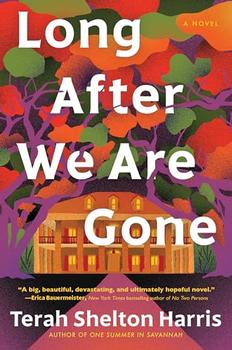Summary | Excerpt | Reading Guide | Discuss | Reviews | Beyond the Book | Readalikes | Genres & Themes | Author Bio

A Novel
by Terah Shelton HarrisExcerpt
Long After We Are Gone
People who don't live here call it the Solomon Plantation after the original owner, John Solomon, who built it in 1782. The locals, including his siblings, call it the Kingdom, in honor of King Solomon, Mance's father, and every firstborn son in the Solomon family. Even for eighteenth-century architecture, the house has a heft and audacity that is striking. A fortress. Too impractical, too big for every iteration of the Solomon family who has lived here.
Mance looks in the direction of the workshop and contemplates his and King's day, set to begin in a few hours. Normally, he doesn't know what King will have him doing. But today, he knows.
The front of the Kingdom is sagging. More specifically, the second-floor porch now droops, the old columns, last replaced a hundred years ago, no longer able to shoulder the weight of the roof. Thanks to a recent hurricane, the entire facade of the house, not just the second-floor porch, would have collapsed if not for the four white columns that circle the house balancing and distributing the weight. Another hurricane or a hit in the right place, and the home his ancestors built will fold in on itself.
They should have been replaced years ago. Mance noticed the wood rot on one of the columns while replacing a few cedar shingles that blew off during several days of spring monsoon weather. King had his own ideas and timeline for renovations, and they always involved Mance's labor but rarely his opinion. Years spent replacing the grand staircase and all the windows, and building and installing all the crown molding, were not in vain. It all needed to be done. The house was in disarray. But the columns—the columns should have been priority.
They are now, which should satisfy Mance, but instead humbles him under the weight of the work King prescribes. King, as always, insists on maintaining architectural accuracy by building his own columns instead of purchasing premade ones, a project that will take a few months to complete and thousands of hours of labor.
"My great-great-granddaddy built this house with his own two hands." King always looks at his ashy, scarred hands, with their own share of half and crooked digits, when he says this. Until today, Mance never looked at his hands. They were well on their way to mirroring King's. Wood has splinters. Tools are sharp. They've dropped a few parts along the way. Such is the life of a carpenter and his carpenter son.
Mance builds things with his hands but never thought they would speak for him. That they could serve as a way of communicating. He presses his fingers against his palm, making a fist, and moves his thumb over his index finger. A. Then slowly lifts his fingers and touches his thumb to the base of his pinkie. B. He curls his fingers. C. He holds the C and tries to recall how to form a D.
Fuck this, Mance thinks and shakes his hand free of the invisible alphabet, lighting a cigarette with it instead. He can do that with ease. The crisp scratch of the flint hitting steel, the sound of burning ash filling his ears. He doesn't need to learn this. Henry is going to be fine. Solomon men stand strong, resilient. They survived slavery, four wars, and Jim Crow. Henry can survive silence.
Mance reminds himself to be where his feet are, the ground beneath him. His land. Ten acres of swampland that no one but him wanted. Not even King when Mance approached him about it.
"We don't need that land."
"It's ten acres. It will give us the waterfront. The Kingdom should lead to the water."
"We have all we need right here."
"If we don't buy it, someone else will. Miss Jessie said she heard some white men in suits asking about it."
"Let it be."
King listened to all of it and heard none of it. Their conversations often went like this, around and around, ending at what King wanted. Let it be. Mance wasn't meant to oppose him or understand why he reached whatever conclusion. To have a voice at all, really. Normally, he was content to defer to King and keep working. He is his father's son, better and worse, and resembles him, a reclusive solemn giant, in personality and physicality, so completely that he's often mistaken for King, mistaken for the oldest child. But he is right about the ten acres. He knew, and he couldn't sit quietly. And he didn't.
Excerpted from Long After We Are Gone by Terah Shelton Harris. Copyright © 2024 by Terah Shelton Harris. Excerpted by permission of Sourcebooks Landmark. All rights reserved. No part of this excerpt may be reproduced or reprinted without permission in writing from the publisher.
Music is the pleasure the human mind experiences from counting without being aware that it is counting
Click Here to find out who said this, as well as discovering other famous literary quotes!
Your guide toexceptional books
BookBrowse seeks out and recommends the best in contemporary fiction and nonfiction—books that not only engage and entertain but also deepen our understanding of ourselves and the world around us.